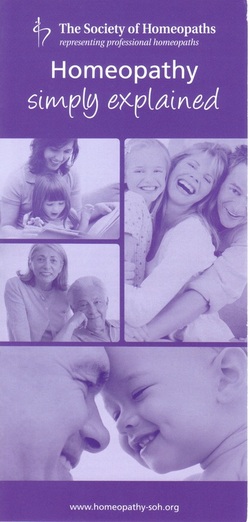”Those who merely study and treat the effects of disease are like those who imagine that they can drive away the winter by brushing the snow from the door. It is not the snow that causes the winter but the winter that causes the snow.” Paracelsus, a 16th century philosopher and physician
What is Homeopathy?
Homeopathy is a form of holistic medicine based on the principle that 'like treats like' i.e. a substance which causes symptoms when taken in large doses, can be used in small amounts to treat
those same symptoms. Homeopathy uses specially prepared, highly diluted substances, given mainly in tablet or liquid form. Prescriptions are tailored to each individual patient, according to their specific symptoms.
Homeopathy is a form of holistic medicine based on the principle that 'like treats like' i.e. a substance which causes symptoms when taken in large doses, can be used in small amounts to treat
those same symptoms. Homeopathy uses specially prepared, highly diluted substances, given mainly in tablet or liquid form. Prescriptions are tailored to each individual patient, according to their specific symptoms.
The holistic approach
Homeopathic medicine treats the person as a whole, rather than treating specific conditions in isolation. This 'holistic' approach is one of the main differences between homeopathy and conventional medicine. For example, if you were suffering from claustrophobia, depression and backache, the conventional route might involve separate courses of treatment from different specialists; by contrast a homeopath will consider all symptoms together as a whole (whether mental, emotional or physical), possibly addressing them with a single prescription.
Homeopathic medicine treats the person as a whole, rather than treating specific conditions in isolation. This 'holistic' approach is one of the main differences between homeopathy and conventional medicine. For example, if you were suffering from claustrophobia, depression and backache, the conventional route might involve separate courses of treatment from different specialists; by contrast a homeopath will consider all symptoms together as a whole (whether mental, emotional or physical), possibly addressing them with a single prescription.
The idea of treating 'like with like'
The idea that a substance can be damaging in large amounts, but beneficial in small amounts is not new to science, in fact this concept (referred to as hormesis) has been around for decades and is increasingly well documented in such fields as biology and toxicology.
You may also come across the concept of treating 'like with like' in conventional medicine e.g. allergens such as pollen being used in minute doses to de-sensitise allergic patients. or tinnitus aids which produce a buzzing noise in the ear to cancel out the buzzing noise of tinnitus.
The idea that a substance can be damaging in large amounts, but beneficial in small amounts is not new to science, in fact this concept (referred to as hormesis) has been around for decades and is increasingly well documented in such fields as biology and toxicology.
You may also come across the concept of treating 'like with like' in conventional medicine e.g. allergens such as pollen being used in minute doses to de-sensitise allergic patients. or tinnitus aids which produce a buzzing noise in the ear to cancel out the buzzing noise of tinnitus.
Is homeopathy safe?
Homeopathic treatment has an excellent safety record [1] and because homeopathic medicines are non-toxic they can be used in cases involving babies, children and during pregnancy.
Homeopathic treatment has an excellent safety record [1] and because homeopathic medicines are non-toxic they can be used in cases involving babies, children and during pregnancy.

The information above has
been taken from this leaflet.
Please contact me if you
would like a copy.







